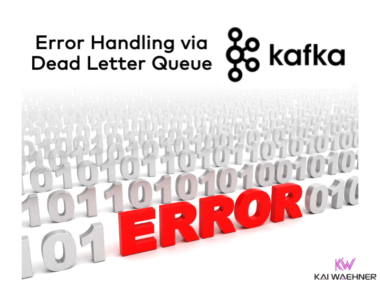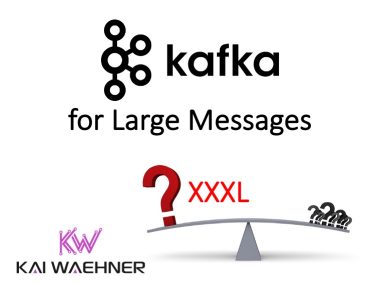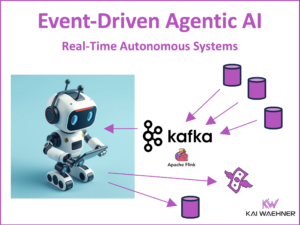In financial services, the ability to prevent fraud in real-time is not just a competitive advantage – it is a necessity. For one of the largest banks in Thailand Krungsri (Bank of Ayudhya), with its vast assets, loans, and deposits, the challenge of fraud prevention has taken center stage. This blog post explores how the bank is leveraging data streaming with Apache Kafka to detect and block fraudulent transactions in under 60 seconds to ensure the safety and trust of its customers.
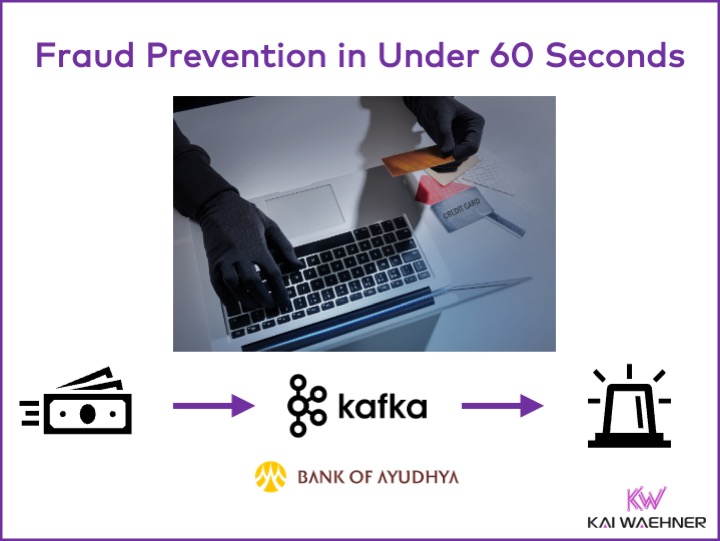
Fraud Prevention with Data Streaming using Apache Kafka and Flink
Fraud detection has become a critical focus across industries as digital transactions continue to rise, bringing with them increased opportunities for fraudulent activities. Traditional methods of fraud detection, often reliant on batch processing, struggle to keep pace with the speed and sophistication of modern scams. Data streaming offers a transformative solution to enable real-time analysis and immediate response to suspicious activities.
Data streaming technologies such as Apache Kafka and Flink enable businesses to continuously monitor transactions, identify anomalies, and prevent fraud before it affects customers. This shift to real-time fraud detection not only enhances security, but also builds trust and confidence among consumers.
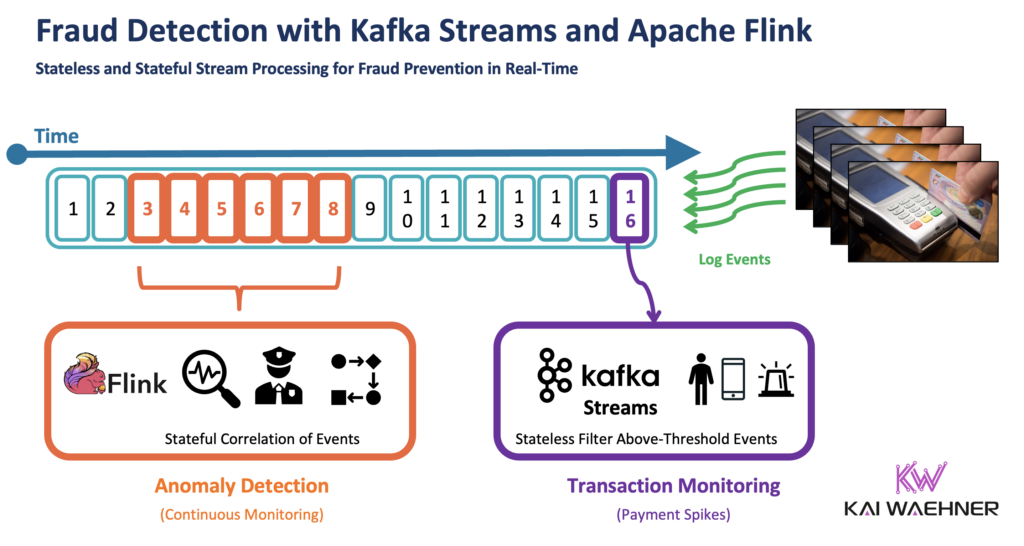
I already explored “Fraud Detection with Apache Kafka, KSQL and Apache Flink” in its own blog post covering case studies across industries from companies such as Paypal, Capital One, ING Bank, Grab, and Kakao Games. And another blog post focusing on “Apache Kafka in Crypto and Financial Services for Cybersecurity and Fraud Detection“.
Kafka is an excellent foundation for fraud prevention and many other use cases across all industries. If you wonder when to choose Apache Flink or Kafka Streams for stream processing, I also got you covered.
Apache Kafka for Fraud Prevention at Krungsri Bank
Krungsri, also known as the Bank of Ayudhya, is one of Thailand’s largest banks. The company offers a range of financial services including personal and business banking, loans, credit cards, insurance, investment solutions, and wealth management.
I had the pleasure to do a panel conversation with Tul Roteseree, Executive Vice President and Head of the Data and Analytics Division from Krungsri at Confluent’s Data in Motion Tour 2024 in Bangkok, Thailand.
One of the most pressing concern for Krungsri is fraud prevention. In today’s digital landscape, scammers often trick consumers into transferring money to mule accounts within a mere 60 seconds. The bank’s data streaming platform allows analyzing payment transactions in real-time, detecting and blocking fraudulent activities before they can affect customers.
While fraud prevention is a primary focus, the bank’s data streaming initiatives encompass a range of use cases that enhance its overall operations. One of the other strategic areas is mainframe offloading. This involves transitioning data from legacy systems to more agile, real-time platforms. This shift not only reduces operational costs but also improves data accessibility and processing speed.
Another critical use case is the enhancement of customer notifications through the bank’s mobile app. By moving from batch processing to real-time data streaming, the bank can provide instant account movement alerts, keeping customers informed and engaged.
The Business Value of Data Streaming with Apache Kafka for Fraud Prevention
Krungsri bank’s decision to adopt data streaming is driven by the need for an event-driven architecture that can handle high-throughput data streams efficiently. Apache Kafka, the leading open source data streaming framework for building real-time data pipelines, was chosen for its scalability and reliability. Kafka’s ability to process vast amounts of data in real-time makes it an ideal choice for the bank’s fraud prevention efforts.
Confluent, a trusted provider of Kafka-based solutions, was selected for its stability and proven track record. The bank valued Confluent’s ability to deliver significant cost savings and speed up project timelines. By leveraging Confluent, the bank reduced its project go-live time from 4-6 months to just 6-8 weeks, ensuring a faster time to market.
Compliance is another critical factor: The bank’s operations are regulated by the Bank of Thailand. The data streaming architecture meets stringent regulatory requirements while ensuring data security and privacy.
From Mainframe to Hybrid Cloud at Krungsri Bank with Change Data Capture (CDC)
The bank’s data streaming architecture is built on a hybrid environment with core banking operations on-premises and mobile applications in the cloud. This setup provides the flexibility needed to adapt to changing business needs and regulatory landscapes.
Data ingestion and transformation occur across various environments, including cloud-to-cloud, cloud-to-on-premise, and on-premise-to-cloud. IBM’s Change Data Capture (CDC) technology is used for data capture. The data streaming platform acts as the intermediary between the mainframe and consumer applications. This “subscribe once, publish many” approach significantly reduces the mainframe’s burden, cutting costs and processing time.
Stream processing is a key component of the bank’s architecture, serving as the primary tool for real-time data transformations and analytics. This capability allows the bank to respond swiftly to emerging trends and threats. The continuous processing of data ensures that fraudulent activities are detected and blocked in under 60 seconds.
The bank’s move to the cloud also facilitates the integration of machine learning and AI models. The cloud transition enables more sophisticated data analysis and personalized services. Events generated through stream processing trigger AI models in the cloud to provide insights that drive decision-making and enhance customer experiences.
Fraud Detection with Stream Processing in Under 60 Seconds
In the fight against fraud, time is of the essence. By leveraging a data streaming platform, one of Thailand’s largest banks is setting a new standard for fraud prevention and ensures that payment transactions are continuously analyzed and blocked in under 60 seconds. With a robust event-driven architecture built on Kafka and Confluent, the bank is not only protecting its customers but also paving the way for a more secure and efficient financial future.
Do you also leverage data streaming for fraud prevention or any other critical use cases? Let’s connect on LinkedIn and discuss it! Stay informed about new blog posts by subscribing to my newsletter.

